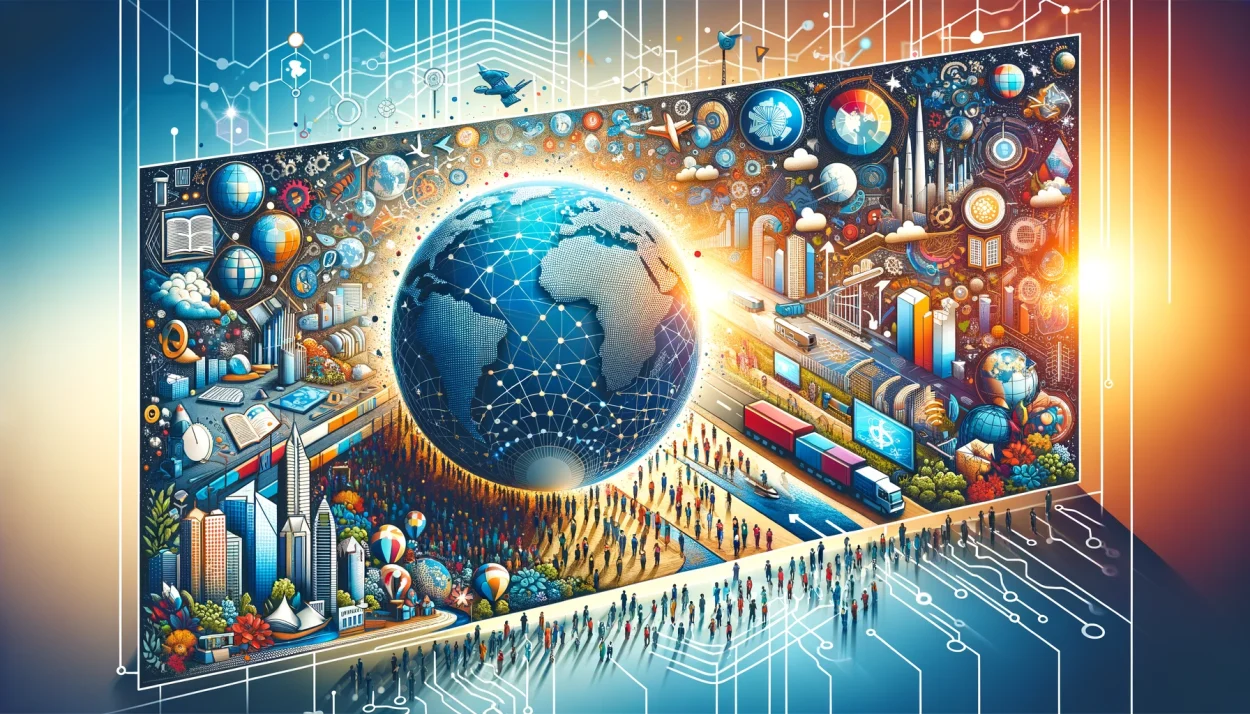
“Understanding the Global World: A Comprehensive Guide to NCERT Class 10 History Chapter”

The Making of a Global World: An Overview
The chapter “The Making of a Global World” explores the process of globalization, tracing its historical roots and examining its impact on the world. It delves into the economic, cultural, and political exchanges that have connected distant parts of the world. The chapter highlights significant years that marked the beginning of global interactions, including the spice trade routes, colonization, the Industrial Revolution, and the two World Wars, leading up to the contemporary era of digital globalization.
Key Points to Remember
- Globalization: A process of interaction and integration among people, companies, and governments worldwide.
- Industrial Revolution: A pivotal era that began in the 18th century, marking a shift to powered, special-purpose machinery, factories, and mass production.
- Colonization: The expansion of European powers across the world, establishing colonies and exploiting resources.
- World Wars: Played a significant role in redrawing boundaries and reshaping economies and societies.
- Economic Liberalization: The opening up of economies to global markets, leading to increased trade and investment across borders.
Important Years
- 15th Century: Beginning of European explorations, leading to the discovery of new trade routes.
- 18th Century: Start of the Industrial Revolution.
- 1914-1918: World War I.
- 1939-1945: World War II.
- 1991: The end of the Cold War and the start of economic liberalization in many countries.
Summary of the Chapter
The chapter outlines how historical events, technological advancements, and economic policies have interconnected the world. It begins with the pre-modern world’s trade networks, moves through the changes brought about by the Industrial Revolution and colonization, and discusses the significant impact of the World Wars and the Cold War. The chapter concludes with the contemporary phase of globalization, characterized by technology, communication, and an integrated global economy.
25 Small Questions and Answers
- What is Globalization?
- Globalization refers to the process of interaction and integration among people, companies, and governments worldwide, leading to the exchange of ideas, goods, and cultures.
- How did the Industrial Revolution contribute to globalization?
- The Industrial Revolution introduced new technologies and production methods, leading to increased trade and economic expansion beyond local markets and national borders.
- What was the role of colonization in globalization?
- Colonization expanded global interactions by establishing European control over vast territories, facilitating the exchange of goods, cultures, and even diseases between the new worlds and the old.
- Explain the significance of World War I and II in the context of globalization.
- The World Wars disrupted global trade and colonial empires, leading to significant political changes and laying the groundwork for a new world order that emphasized international cooperation and economic integration.
- What is economic liberalization?
- Economic liberalization refers to the reduction of state intervention in economic activities, promoting free trade, open markets, and the reduction of tariffs and barriers to facilitate global trade and investment.
- How did technological advancements contribute to globalization?
- Technological advancements in transportation (such as steamships and railways) and communication (like the telegraph and the internet) have significantly reduced the time and cost of moving goods and information across the world, thereby accelerating globalization.
- What impact did the Cold War have on global economic policies?
- The Cold War led to the division of the world into two economic blocs—the capitalist West led by the USA and the communist East led by the USSR—each promoting its economic ideologies and practices, influencing global trade and economic policies.
- How does globalization affect cultures worldwide?
- Globalization leads to cultural exchange and fusion, where cultures adopt and integrate elements from each other. However, it can also result in cultural homogenization and the loss of indigenous cultures and languages.
- What are the negative impacts of globalization on the environment?
- Globalization has led to increased consumption, industrialization, and transportation, contributing to environmental degradation, loss of biodiversity, and climate change due to higher carbon emissions.
- How has globalization influenced global income and wealth distribution?
- While globalization has contributed to economic growth and poverty reduction in some regions, it has also led to increased income inequality both within and between countries, as benefits are not evenly distributed.
- What is the impact of globalization on culture?
- Globalization can lead to cultural homogenization, where dominant cultures overshadow local cultures, but it also fosters cultural exchange and diversity.
- How does globalization affect the environment?
- Globalization can lead to environmental degradation due to increased consumption, industrialization, and the exploitation of natural resources, but it also promotes global environmental awareness and solutions.
- What was the role of trade agreements in globalization?
- Trade agreements like NAFTA and the European Union have facilitated globalization by reducing trade barriers and encouraging economic integration among member countries.
- How has globalization affected employment?
- Globalization has created jobs in industries like technology and services but has also led to job losses in sectors exposed to international competition, highlighting the need for workforce adaptability.
- What is cultural globalization?
- Cultural globalization refers to the transmission of ideas, meanings, and values around the world in such a way as to extend and intensify social relations, leading to an interconnectedness among global communities.
- Can globalization be reversed?
- While aspects of globalization can be slowed or altered through policies and social movements, the interconnectedness of the world makes a complete reversal unlikely without significant global upheaval.
- What is economic globalization?
- Economic globalization is the increasing economic interdependence of national economies across the world through a rapid increase in cross-border movement of goods, services, technology, and capital.
- How does globalization affect health?
- Globalization has led to improvements in healthcare and access to medicine but also contributes to the spread of diseases across borders and raises challenges in health equity and access.
- What are digital divides in the context of globalization?
- The digital divide refers to the gap between individuals, households, businesses, and geographic areas at different socio-economic levels with regard to their opportunities to access information and communication technologies.
- What is the role of international organizations in globalization?
- International organizations like the United Nations, World Bank, and International Monetary Fund facilitate cooperation, provide aid, and help manage global issues that arise from globalization.
- How has globalization impacted education?
- Globalization has increased access to education through technology, exchange programs, and global academic collaborations, but disparities in educational quality and access remain a challenge.
- What is financial globalization?
- Financial globalization refers to the integration of national financial systems with the international financial markets, leading to increased capital flows across borders.
- How do global inequalities affect globalization?
- Global inequalities can be exacerbated by globalization, as wealth and opportunities may concentrate in certain regions or among certain groups, leading to social and economic disparities.
- What is global governance?
- Global governance involves cooperative leadership and regulation by international organizations and states to address global issues, ranging from climate change to economic policy.
- How can globalization be made more inclusive?
- Making globalization more inclusive involves ensuring equitable access to its benefits, protecting vulnerable populations, promoting sustainable practices, and fostering international cooperation to address global challenges.